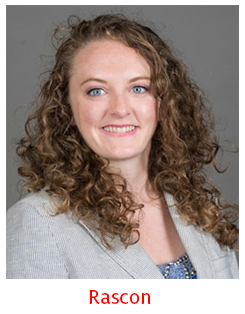Student News
ACCP Geriatrics Group Travel Award to Help Pharm.D. Student Learn, Network with Specialists at Global Conference on Clinical Pharmacy
A UH College of Pharmacy Pharm.D. student is aiming to expand her knowledge and professional network within the elder care environment and patient population, thanks to a travel award to attend a major clinical pharmacy meeting.
Third-year Pharm.D. student Katie Rascon is looking forward to her second trip to the American College of Clinical Pharmacy (ACCP) Global Conference on Clinical Pharmacy, which is being held Oct. 20-23 this year in Seattle, Wash. Rascon, who is the current president of the UHCOP Chapter of the Student College of Clinical Pharmacy, recently received one of two available travel awards from ACCP's Geriatrics Practice and Research Network to offset her expenses for attending the meeting.
Rascon said was interested in geriatric patient care long before entering pharmacy school, and has only intensified during her Pharm.D. education.
"The elderly are especially in need of advocates because they are at high risk of being overmedicated and medically underrepresented," Rascon said.

Rascon's recent participation in the "No Place Like Home" interprofessional experience program operated by Baylor College of Medicine in collaboration with UHCOP. Under the supervision of a physician or nurse practitioner, the program brings together medical and pharmacy students into the homes of mostly homebound elderly patients classified as "medically complex" due to multiple disease states and health issues requiring significant medical monitoring and care, such as advanced diabetes, obesity and cardiovascular disease.
"My role as a pharmacy student was to conduct medication reconciliation and discuss patient adherence, drug interactions, medication costs and critical patient education," Rascon said. "This experience broadened my understanding and insight into adapting guidelines to address the physical, psychological and social needs of geriatric patients. It gave me perspective on how quality of life can be as important as quantity of life, and this has to be taken into consideration when determining to start or discontinue medications."
Rascon said she hopes to combine the insights and contacts obtained at the ACCP meeting with the skills, training and knowledge of her UHCOP Pharm.D. education to be part of a relatively new movement in elder care called "socially progressive elderly living centers."
"A few examples include the use of therapeutic hens and the integration of intergenerational centers into nursing homes to combat loneliness and to help provide physical and mental stimulation and activity," Rascon said. "The concept of elderly care that is a little more organic, where residents have more interaction and freedom of choice, is gaining popularity in Europe; with the development of 'dementia villages' among other innovative care ideas."
